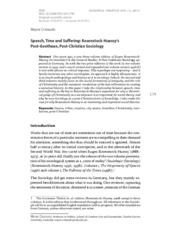Speech, Time and Suffering: Rosenstock-Huessy's Post-Goethean, Post-Christian Sociology
Апстракт
Five years ago, a new three volume édition of Eugen Rosenstock- Huessy (to translate) In the Cross of Reality: A Post-Goethean Sociology appeared in Germany. As with the two prior editions of the work (a one volume version in 1925, and a much revised and expanded two volume version 1956/8) it met with almost no critical response. This is perhaps not surprising - and it barely mentions any other sociologists, its approach is highly idiosyncratic, it is as much anthropology and history as it is sociology. Indeed, the second and third volumes mainly focus on the social formations of antiquity, and the role of Christianity and the messianic revolutions of the last millennium in creating a universal history. In this paper I take the relationship between speech, time and suffering as the key to Rosenstock-Huessy’s argument for why a theoretical grasp of Christianity as a social power is so important for social theory, and why he sees Sociology as a post-Christian form of knowledge. I also ma...ke the case for why Rosenstock-Huessy is an interesting and important social theorist.
Кључне речи:
names / tribes / empires / city / Israelites / statesИзвор:
Filozofija i društvo / Philosophy and Society, 2015, 179-204Издавач:
- Beograd : Institut za filozofiju i društvenu teoriju
Институција/група
IFDTTY - JOUR AU - Cristaudo, Wayne PY - 2015 UR - http://rifdt.instifdt.bg.ac.rs/123456789/231 AB - Five years ago, a new three volume édition of Eugen Rosenstock- Huessy (to translate) In the Cross of Reality: A Post-Goethean Sociology appeared in Germany. As with the two prior editions of the work (a one volume version in 1925, and a much revised and expanded two volume version 1956/8) it met with almost no critical response. This is perhaps not surprising - and it barely mentions any other sociologists, its approach is highly idiosyncratic, it is as much anthropology and history as it is sociology. Indeed, the second and third volumes mainly focus on the social formations of antiquity, and the role of Christianity and the messianic revolutions of the last millennium in creating a universal history. In this paper I take the relationship between speech, time and suffering as the key to Rosenstock-Huessy’s argument for why a theoretical grasp of Christianity as a social power is so important for social theory, and why he sees Sociology as a post-Christian form of knowledge. I also make the case for why Rosenstock-Huessy is an interesting and important social theorist. PB - Beograd : Institut za filozofiju i društvenu teoriju T2 - Filozofija i društvo / Philosophy and Society T1 - Speech, Time and Suffering: Rosenstock-Huessy's Post-Goethean, Post-Christian Sociology SP - 179 EP - 204 DO - 10.2298/FID1501179C ER -
@article{
editor = "Jovanov, Rastko",
author = "Cristaudo, Wayne",
year = "2015",
abstract = "Five years ago, a new three volume édition of Eugen Rosenstock- Huessy (to translate) In the Cross of Reality: A Post-Goethean Sociology appeared in Germany. As with the two prior editions of the work (a one volume version in 1925, and a much revised and expanded two volume version 1956/8) it met with almost no critical response. This is perhaps not surprising - and it barely mentions any other sociologists, its approach is highly idiosyncratic, it is as much anthropology and history as it is sociology. Indeed, the second and third volumes mainly focus on the social formations of antiquity, and the role of Christianity and the messianic revolutions of the last millennium in creating a universal history. In this paper I take the relationship between speech, time and suffering as the key to Rosenstock-Huessy’s argument for why a theoretical grasp of Christianity as a social power is so important for social theory, and why he sees Sociology as a post-Christian form of knowledge. I also make the case for why Rosenstock-Huessy is an interesting and important social theorist.",
publisher = "Beograd : Institut za filozofiju i društvenu teoriju",
journal = "Filozofija i društvo / Philosophy and Society",
title = "Speech, Time and Suffering: Rosenstock-Huessy's Post-Goethean, Post-Christian Sociology",
pages = "179-204",
doi = "10.2298/FID1501179C"
}
Jovanov, R.,& Cristaudo, W.. (2015). Speech, Time and Suffering: Rosenstock-Huessy's Post-Goethean, Post-Christian Sociology. in Filozofija i društvo / Philosophy and Society Beograd : Institut za filozofiju i društvenu teoriju., 179-204. https://doi.org/10.2298/FID1501179C
Jovanov R, Cristaudo W. Speech, Time and Suffering: Rosenstock-Huessy's Post-Goethean, Post-Christian Sociology. in Filozofija i društvo / Philosophy and Society. 2015;:179-204. doi:10.2298/FID1501179C .
Jovanov, Rastko, Cristaudo, Wayne, "Speech, Time and Suffering: Rosenstock-Huessy's Post-Goethean, Post-Christian Sociology" in Filozofija i društvo / Philosophy and Society (2015):179-204, https://doi.org/10.2298/FID1501179C . .



